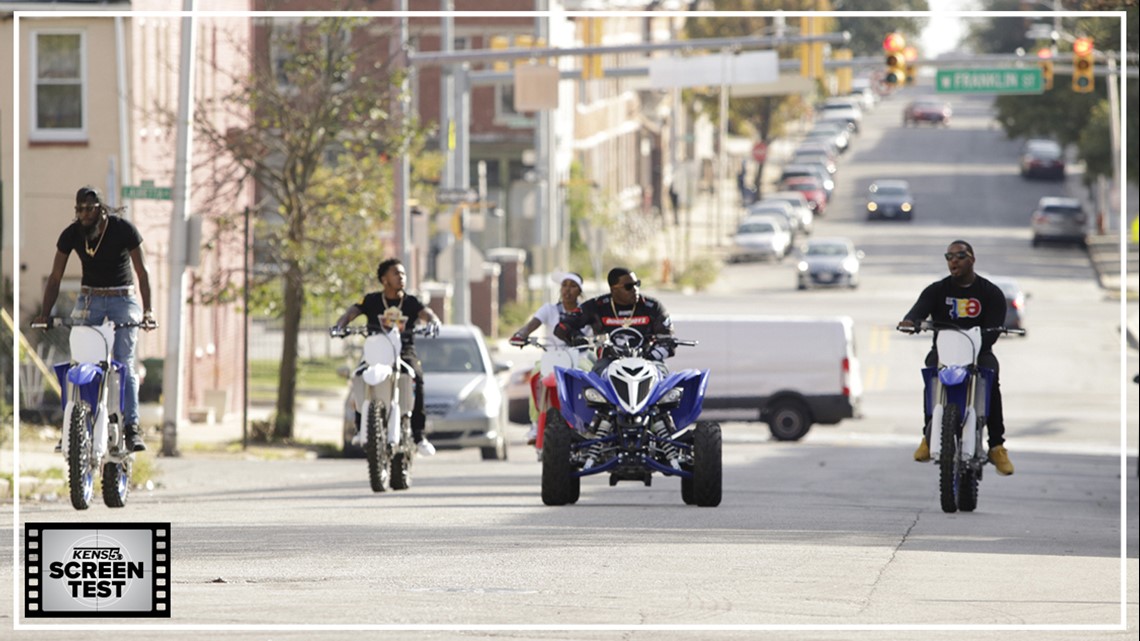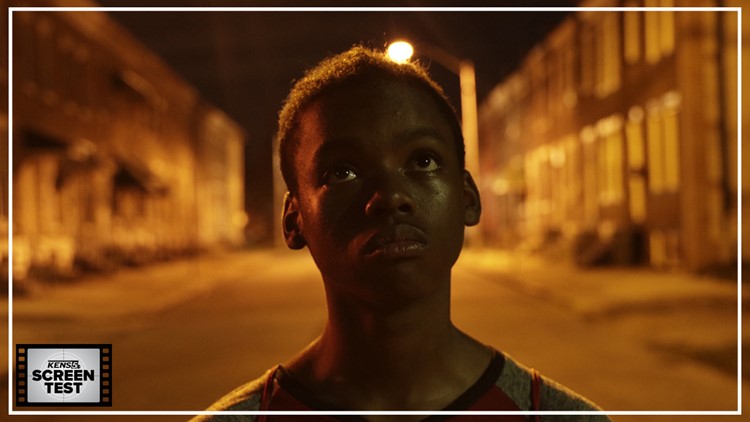More often than not, dramas that motor along the bumpy roads of adolescence ask that we meet them in the middle when it comes to a character’s rough age versus the age of the actor filling their shoes. In “Charm City Kings,” the concession is easy to make.
It’s mentioned that the young boy we follow – played by Jahi Di’Allo Winston, who doesn’t turn 17 until late November – is about to enter the eighth grade. There’s no eyebrow-raising about it. He’s a lanky lad with a high-pitched voice maneuvering the wills of men who tower above him, and Winston’s performance – precious because of his youth, excellent because of its fire – delicately underscores the dangerous moments that are to come as much as it magnifies the exuberant ones.
That boy at the center of things in “Charm City Kings” – a Baltimore prince whose beaming smile portends joyous anticipation and inevitable hard truths – goes by Mouse, although the first few times we hear his name out loud we may swear we hear “Miles” instead. The irony is that Miles is just as appropriate a name to call our pint-sized protagonist as Mouse is—his ambitions stretch beyond the small house where his mom and sister live and he’s got the horsepower to go the distance, even if he’s conflicted over his vehicle of choice.
And if Mouse (Jahi Di’Allo Winston) is the young prince of his Baltimore block, who are its kings? That would be the members of the Midnight Clique that come rumbling down the street, riding dirt bikes like loyal oil-and-steel steeds. Mouse, who’s long harbored dreams of becoming a veterinarian, has ambitions to join their ranks as well; though he’s still young to make sense of his fascination, it’s easy to spot in his dropped jaw and amazed stare. The first time we see the Midnight Clique cresting the paved hill – regal and powerful and screaming of independence – we may be struck with the same fascination. And as this intensely emotional coming-of-age story about surrogate brothers and second chances set against a vivid Baltimore backdrop widens, so too will Mouse’s perspective of the different paths that emerge before him, and the different tolls they demand.
“Charm City Kings” – the latest feature from Puerto Rican director Angel Manuel Soto, demonstrating tangible verve and virtuosity in abundance – is tightly anchored to Mouse’s compulsive frame of mind; to understand him is to understand how he approaches his various relationships. Interconnectivity is the fuel to Sherman Payne’s screenplay (with “Moonlight” director Barry Jenkins contributing to the story), and it’s also key that the large ensemble is more a complicated web of figures than a chain of dominos to be knocked over with narratively mechanical ease. There’s the local cop played by William Catlett who takes it upon himself to tilt Mouse toward the straight-and-narrow; the goofball best friends who are rarely less than comically delightful; the single mom who leaves every evening to work the graveyard shift; the feisty sister Mouse refuses to babysit when Mom heads out; the cute girl who’s just moved in down the street; the local garage owner and Midnight Clique member Blax (Meek Mill, verging on transcendent in his performance) who gives Mouse something to aspire to as the hot summer rages on.
You can check off the coming-of-age tropes – expectations, first romance, messy decisions – with each person Mouse crosses paths with. It’s through Mouse’s brother, then, that “Charm City Kings” first hints at its own intrigue and purpose. He’s first spotted in grainy video pulling off fancy wheelies on his bike before affectionately yanking a younger Mouse onto the seat with him. The tender introduction quickly becomes a tragic one—we find out current-day Mouse is watching the video on his cell phone as the words “Ride In Peace” appear. We never meet his brother in person and don’t learn what happened to him until later on, but what’s quickly established is a heavy sense of implication that hangs not only over Mouse’s journey, but also, later on, over how Blax and Catlett’s detective character slyly begin to shape his future for him.
What makes them so keen on helping him? And why might they know what’s better for him than he does? If “Charm City Kings” is a bit predictable in providing answers, the across-the-board excellence of its cast keeps us invested in seeing how those answers will come, as does the ceaseless vigor of filmmaking through which we explore this movie’s depiction of Baltimore. I can recall only a handful of moments where cinematographer Katelin Arizmendi’s camera was a stoic presence; more often than not, it’s swirling and pivoting and gliding through dark garages and backyards and packed street corners, emphasizing the near-deliriousness with which Mouse navigates his neighborhood and his life. Sharp editing keeps the pace buoyant even when narrative execution is less than precise, and Arizmendi’s penchant for close-ups thrillingly keys us into the community dynamics.


It’s all more than enough to excuse Soto when things get melodramatic…in fact, there’s little to excuse. The melodrama here is piercingly effective in constructing “Charm City Kings” as a story about burgeoning Black male agency on American streets that seek to rob or distort it; this is a rare case in which archetypical foundations play to a movie’s benefit. Is that partly because of how barren the well of Black stories continues to be in American moviemaking? It’d be naïve to suggest otherwise. But that also doesn’t blunt the movie’s subtle profundity.
Winston is a firecracker and then a cracked avatar of choked youthful frustrations as Mouse. His ambitions to ride alongside the Midnight Clique aren’t ripe enough to understand what motivates their casual defiance, nor the dangers of the two-bit crimes its more daring members participate in. “It ain’t about flexing; it’s about freedom,” Mouse is told by Blax, who, to Payne’s credit, is less of an arbitrary model for purity than the film’s explicit nods to “The Karate Kid” and Mr. Miyagi may suggets. “Charm City Kings” isn’t as simple as bad choices and good ones; it’s more about reckoning with the choices we do or don’t deserve having the capacity to make.
All the while, the capacity for violence resides on the edges of the story—just out of Mouse’s line of sight, just within ours. The first taste of it is an implied one, when a white cop aggressively chases a pair of Midnight Clique cruisers in a legitimately thrilling sequence of high speeds, tight turns and swooping camera shots. Later, when violence does erupt in a colder and more calculated moment, it muddles the path that Mouse has ostensibly chosen for himself.
Only when things are at their most blood-pumpingly consequential late in “Charm City Kings” do we begin to suspect that the various characterizations conveniently reside within a closed feedback loop of deadly chaos and murky morals that ever so slightly betrays its setting’s singular scope. Yet the third-act tidiness avoids undercutting the fragility of a future that Mouse increasingly endangers while searching for freedom across a kingdom of urban parks and cement overpasses. In this story about a Black child navigating the world, there isn’t self-actualization without a few skid marks.
"Charm City Kings" is rated R for pervasive language, sexual references and some violence. It begins streaming on HBO Max Thursday.
Starring: Jahi D'Allo Winston, Milan Ray, William Catlett, Meek Mill
Directed by Angel Manuel Soto
2020
OTHER SCREEN TEST REVIEWS
- ‘Possessor’ Review: Brandon Cronenberg’s newest is a cerebral psychothriller and a mind-melting minefield of self-disintegration
- ‘Save Yourselves!’ Review: Aliens and millennial apathy come for Jack Reynolds and Sunita Mani in charming sci-fi-comedy
- ‘Ottolenghi and the Cakes of Versailles’ Review: Sumptuous ideas, sour presentation
- ‘Kajillionaire’ Review: Miranda July’s newest oddball drama is her most narratively triumphant
- ‘The Nest’ Review: Jude Law, Carrie Coon spiral toward marital oblivion
- ‘The Secrets We Keep’ Review: Noomi Rapace shines in shoddy morality play
- ‘The Devil All The Time’ Review: Tom Holland leads all-star cast in glum, aimless portrait of a tarnished America
- 'Buoyancy' Review: The cruelties of a corrupt fishing industry are spotlighted in one-dimensional story
- ‘I’m Thinking of Ending Things’ Review: Charlie Kaufman resumes his search for meaning in haunting Netflix head trip



